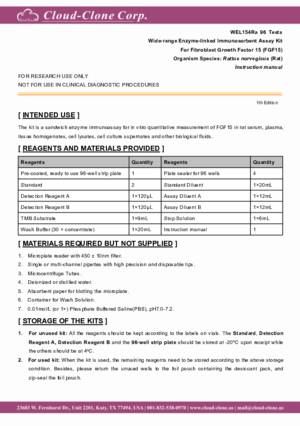Packages (Simulation)

Reagent Preparation

Image (I)
Image (II)
Certificate


Wide-range ELISA Kit for Fibroblast Growth Factor 15 (FGF15)
- Product No.WEL154Ra
- Organism SpeciesRattus norvegicus (Rat) Same name, Different species.
- Sample TypeSerum, plasma, tissue homogenates, cell lysates, cell culture supernates and other biological fluids
- Test MethodDouble-antibody Sandwich
- Assay Length3h
- Detection Range15.6-1,000pg/mL
- SensitivityThe minimum detectable dose of this kit is typically less than 6.1pg/mL.
- DownloadInstruction Manual
- UOM 48T96T 96T*5 96T*10 96T*100
- FOB
US$ 556
US$ 794
US$ 3573
US$ 6749
US$ 55580
For more details, please contact local distributors!
Specificity
This assay has high sensitivity and excellent specificity for detection of Wide-range Fibroblast Growth Factor 15 (FGF15).
No significant cross-reactivity or interference between Wide-range Fibroblast Growth Factor 15 (FGF15) and analogues was observed.
Recovery
Matrices listed below were spiked with certain level of recombinant Wide-range Fibroblast Growth Factor 15 (FGF15) and the recovery rates were calculated by comparing the measured value to the expected amount of Wide-range Fibroblast Growth Factor 15 (FGF15) in samples.
| Matrix | Recovery range (%) | Average(%) |
| serum(n=5) | 88-101 | 93 |
| EDTA plasma(n=5) | 91-98 | 95 |
| heparin plasma(n=5) | 79-101 | 90 |
Precision
Intra-assay Precision (Precision within an assay): 3 samples with low, middle and high level Wide-range Fibroblast Growth Factor 15 (FGF15) were tested 20 times on one plate, respectively.
Inter-assay Precision (Precision between assays): 3 samples with low, middle and high level Wide-range Fibroblast Growth Factor 15 (FGF15) were tested on 3 different plates, 8 replicates in each plate.
CV(%) = SD/meanX100
Intra-Assay: CV<10%
Inter-Assay: CV<12%
Linearity
The linearity of the kit was assayed by testing samples spiked with appropriate concentration of Wide-range Fibroblast Growth Factor 15 (FGF15) and their serial dilutions. The results were demonstrated by the percentage of calculated concentration to the expected.
| Sample | 1:2 | 1:4 | 1:8 | 1:16 |
| serum(n=5) | 85-101% | 78-93% | 78-90% | 94-102% |
| EDTA plasma(n=5) | 79-90% | 82-102% | 91-105% | 95-104% |
| heparin plasma(n=5) | 78-98% | 90-101% | 78-90% | 91-101% |
Stability
The stability of kit is determined by the loss rate of activity. The loss rate of this kit is less than 5% within the expiration date under appropriate storage condition.
To minimize extra influence on the performance, operation procedures and lab conditions, especially room temperature, air humidity, incubator temperature should be strictly controlled. It is also strongly suggested that the whole assay is performed by the same operator from the beginning to the end.
Reagents and materials provided
| Reagents | Quantity | Reagents | Quantity |
| Pre-coated, ready to use 96-well strip plate | 1 | Plate sealer for 96 wells | 4 |
| Standard | 2 | Standard Diluent | 1×20mL |
| Detection Reagent A | 1×120µL | Assay Diluent A | 1×12mL |
| Detection Reagent B | 1×120µL | Assay Diluent B | 1×12mL |
| TMB Substrate | 1×9mL | Stop Solution | 1×6mL |
| Wash Buffer (30 × concentrate) | 1×20mL | Instruction manual | 1 |
Assay procedure summary
1. Prepare all reagents, samples and standards;
2. Add 100µL standard or sample to each well. Incubate 1 hours at 37°C;
3. Aspirate and add 100µL prepared Detection Reagent A. Incubate 1 hour at 37°C;
4. Aspirate and wash 3 times;
5. Add 100µL prepared Detection Reagent B. Incubate 30 minutes at 37°C;
6. Aspirate and wash 5 times;
7. Add 90µL Substrate Solution. Incubate 10-20 minutes at 37°C;
8. Add 50µL Stop Solution. Read at 450nm immediately.
GIVEAWAYS
INCREMENT SERVICES
| Magazine | Citations |
| Endocrinology. | Naringenin Prevents Obesity, Hepatic Steatosis, and Glucose Intolerance in Male Mice Independent of Fibroblast Growth Factor 21 PubMed: 25774553 |
| Inflammatory Bowel Diseases | Alterations in Enterohepatic Fgf15 Signaling and Changes in Bile Acid Composition Depend on Localization of Murine Intestinal Inflammation pubmed:27580383 |
| J Lipid Res. | Commensal bacteria at the crossroad between cholesterol homeostasis and chronic inflammation in atherosclerosis. pubmed:28130274 |
| BMC Endocrine Disorders | The relationship between bile acid concentration, glucagon-like-peptide 1, fibroblast growth factor 15 and bile acid receptors in rats during progression of glucose intolerance 10.1186/s12902-017-0211-5 |
| Journal of Physiology and Biochemistry | The ileal FGF15/19 to hepatic FGFR4 axis regulates liver regeneration after partial hepatectomy in mice Pubmed:29468415 |
| Developmental Cell | FGF15 Activates Hippo Signaling to Suppress Bile Acid Metabolism and Liver Tumorigenesis Pubmed: 30745141 |
| Endocrinology | Interactions between the gravitostat and the fibroblast growth factor system for the regulation of body weight |
| Food & Function | Lactoferrin promotes bile acid metabolism and reduces hepatic cholesterol deposition by inhibiting the farnesoid X receptor (FXR)-mediated enterohepatic axis Pubmed: 31626262 |
| Journal of Translational Medicine | Gut microbiota from coronary artery disease patients contributes to vascular dysfunction in mice by regulating bile acid metabolism and immune activation Pubmed: 33036625 |
| Chin Med | Si-Wu-Tang ameliorates fibrotic liver injury via modulating intestinal microbiota and bile acid homeostasis 34736501 |
| Int J Biol Sci | Dynamics of the gut-liver axis in rats with varying fibrosis severity Pubmed:35637968 |













